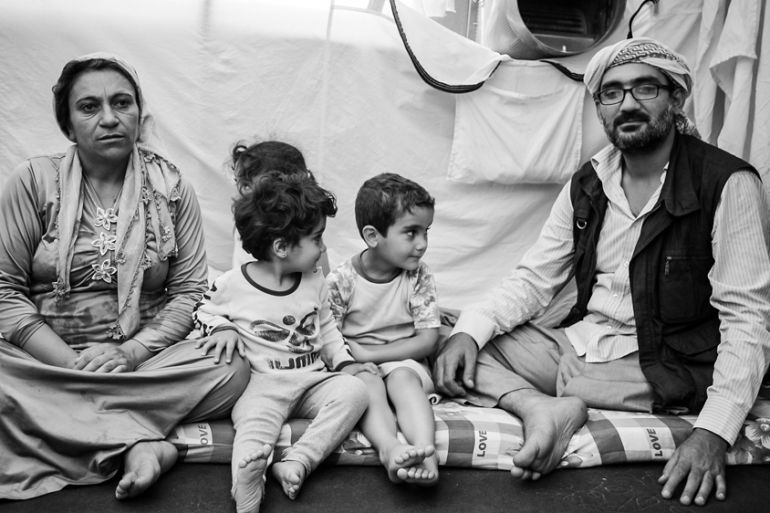Refugee: The gruelling journey from Syria to Iraq
One of thousands of refugees at the Kawergosk camp in Erbil, Nuri Khan says his life has become hopeless.

Kawergosk refugee camp, Erbil, Iraq – Inside his family’s small tent on the sweltering grounds of Erbil’s Kawergosk refugee camp, Nuri Khan begs for death.
“I’m ready to die,” 33-year-old Khan tells Al Jazeera, perched on a thin mattress on the floor of his tent. His right leg is crossed under him; his left was blown off when he drove through a firefight in Aleppo, months before he fled to Iraq. He now spends his days sitting in the entryway to his tent, selling sweets and biscuits to camp residents.
Keep reading
list of 4 itemsPalestinian Prisoner’s Day: How many are still in Israeli detention?
‘Mama we’re dying’: Only able to hear her kids in Gaza in their final days
Europe pledges to boost aid to Sudan on unwelcome war anniversary
“I’m very tired, very depressed,” Khan says. “If I had a chance to kill myself, I’d do it.”
Khan’s pregnant wife and their three children – aged two, three and five years old – listen as he speaks.
Every day I watch the news on TV... and I cannot believe what I am seeing. Syria, my beautiful country, is destroyed. What's happening now is like a bad dream.
The Kawergosk camp is packed with more than 10,000 Syrian refugees who fled their country’s civil war, which has moved into its fifth year.
UNICEF staff working inside the camp, which opened in the summer of 2013, expect the numbers to rise further as the Syrian conflict grinds on. Water and electricity are already in short supply.
Unbearable life
The Khan family came to Kawergosk in November 2014 after life in Aleppo became unbearable, Khan says.
“There were dozens of police in the streets,” he says. “There were dead people in the streets, and dogs were eating their bodies.”
For years, Khan says his neighbourhood was consumed by fighting between Syrian regime soldiers and other armed groups – the Free Syrian Army, and later, groups such as Jabhat al-Nusra, Ahrar al-Sham and the Tawhid Brigade.
All of this was tolerable, he says, until the Islamic State of Iraq and the Levant (ISIL) arrived on the scene.
Khan, who worked as a taxi driver in and around Aleppo, says he picked up a customer one day and ended up driving through a firefight between ISIL and regime soldiers. A rocket hit his taxi, killing his passenger and shattering his leg.
Six months later, as ISIL took full control of his village, Khan knew it was time to flee.
“We are Yazidis, and they started killing Yazidis. They killed more than a dozen families in our village alone,” Khan says.
‘We were terrified’
The family left Aleppo with just the clothes on their backs, to avoid drawing attention. They walked for hours to find a taxi, Khan leaning on a neighbour’s shoulder for support.
“We left in a panic,” he says. “We left everything behind. We were terrified.”
LIFE ON HOLD: The Struggle of Syrian Refugees in Lebanon
After crossing the border into Urfa, Turkey, the family travelled to Erbil, where they found shelter at the Kawergosk camp.
But although they are now relatively safe, Khan says, life at the camp is miserable. With limited mobility, he cannot work to support his family; he earns a meagre income from the sweets and biscuits he sells inside the camp.
![More than 10,000 Syrian refugees live in the Kawergosk camp in Erbil, Iraq [Megan O'Toole/ Al Jazeera]](/wp-content/uploads/2015/06/4bcb5281a31946b5ad3acad143977042_19.jpeg)
Each month, the family receives about $19 per person in food stamps, but they say it is not enough. They depend on the charity of neighbours and friends.
Khan says there are no services in the camp for handicapped people – not even an appropriate toilet. At the same time, the amputation site near his hip has never entirely healed, causing him great pain every day.
Country destroyed
Asked about life in Syria before the war, Khan’s face changes. His features soften; a light enters his eyes.
“I had a very good life. We had our own home, our own taxi – there was always money in the bank,” Khan says. “I was very happy in those days.”
What he misses the most, he says, is his old home and the sense of community he shared with neighbours. He has lost contact with almost all of them.
If he could leave Kawergosk, Khan says he would set out for Europe – away from the Arab world, where the threat of ISIL hangs heavy.
“Every day I watch the news on TV… and I cannot believe what I am seeing,” Khan says.
“Syria, my beautiful country, is destroyed. What’s happening now is like a bad dream. Everything is gone. There is no future. We don’t know when this will end.”
Follow Megan O’Toole on Twitter: @megan_otoole